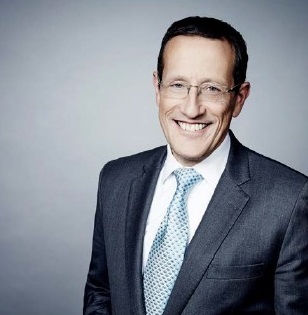
Interview with CNN’s Richard Quest
Foremost international business broadcaster Richard Quest is one of the best-known faces of the CNN team. Quest, who moderated the 22nd UNWTO General Assembly’s high-level debate on tourism and the SDGs, shares his views on the prospects of the sector.
Q – You have been reporting about the tourism sector for the last decade. How do you see the evolution of the sector in the coming years?
A – One has to bear in mind that tourism is one of the fastest-growing sectors in the world; its percentage of GDP is 10% and it represents 1 out of 10 jobs. Its significance is not in doubt. The question is how to grow in a sustainable way. Can the benefits be enjoyed by all or do we end up with a race to the bottom? That is going to be the big challenge: to create a tourism industry that is meaningful, sustainable and profitable.
Q – UNWTO works closely with the media and contributes to enhancing the capacities of journalists to report on tourism. What in your view is the role of the media community in supporting sustainable tourism?
A – The role of the media is not about promoting one view or another. Sustainable tourism is a policy already developed in the context of the United Nations and more precisely in the World Tourism Organization, as part of the SDGs.
Therefore, we have to report about it, about the progress being made and whether it has sense or whether it goes off the rails. I think that one thing that the media can become obsessed with is the question of if we are creating this framework, if the goals are being met, if UNWTO is doing the right thing or the wrong thing…That is not our job. Our job is to report on what is happening, how it is being enforced and how it is being monitored, and to point out the successes and those situations where more work needs to be done. But we are not in the business of promoting somebody else’s agenda. It would be a great mistake for people to believe that this is the role of the media.
Q – One of UNWTO’s areas of work is to support tourism administrations’ communication with the media. What would be your advice to destinations to improve their media relations?
A – You cannot engage with the media only when things are going well. You cannot contact people like me and say “I have a great story for you, come along” or “why do you not come and promote this?” A good story is a good story, but the real relationships are those that are built over a long period of time, where the media grows to understand the good that is happening in your country, the difficulties there and what is being done to solve those.
Tourism ministers who are in a regular dialogue with the media saying “this is what we are doing about sustainable tourism”, “this is what we are doing about terrorism”, “this is what we are doing about security” or “by the way, we have an issue with overcapacity or overbuilding on the seafront, this is what we are doing”… These are the ministers who will have my ear when they have a good story or a challenging story.
So, my advice to any tourism minister or tourism bureau is that media relations cannot be turned on and off. It does not work that way. You will get burnt. Longstanding relations with the media build bridges that both parties cross in the future.
SOURCE: UNWTO Daily, Author unknown.
